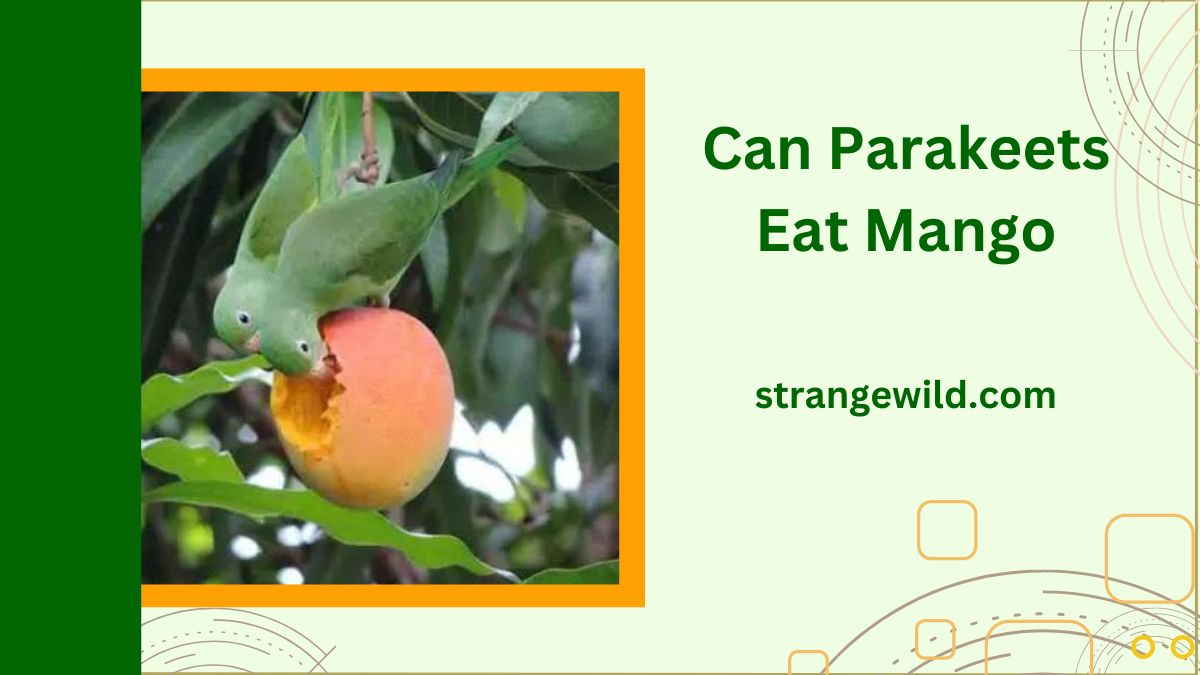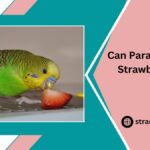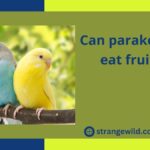Can Parakeets Eat Mango? Is It Healthy Fruit
Parakeets can consume almost any fruit that is sold today without any problems. All fruits and vegetables, with the exception of avocados, include watermelons, bananas, apples, and oranges. But are parakeets able to eat mango? Thankfully, mango is included in this group. Tropical fruits are called stone fruits including mangoes. Can parakeets eat oranges
This suggests that they contain a tough seed in the center. They have pale skin that could be orange, red, or green on the outside. Yellow flesh that is tender and delicious can be found inside. Mangoes are popular among parakeets. We will address all of your concerns regarding feeding mangoes to your parakeets in this article.
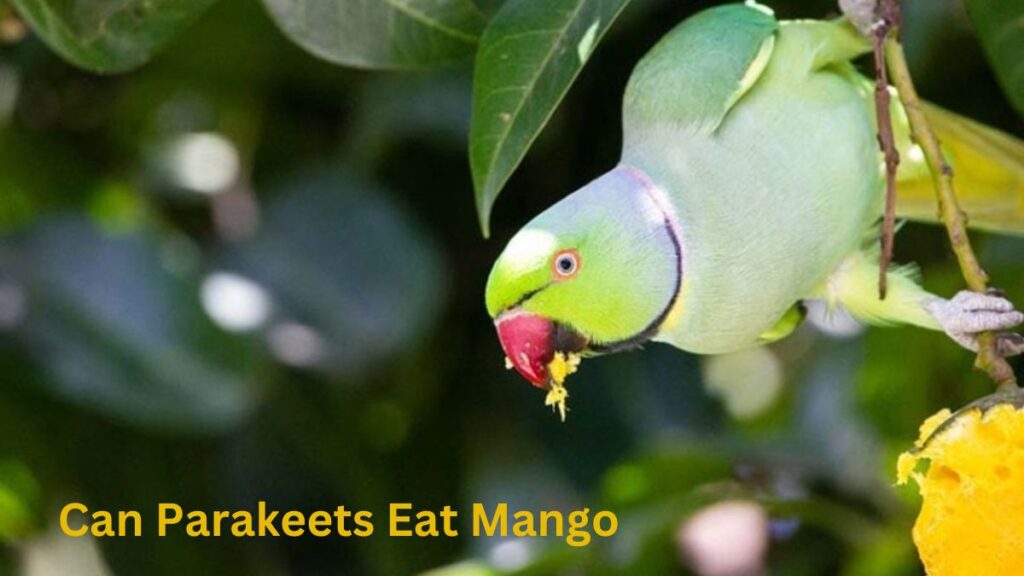
Can Parakeets Enjoy Eating Mango?
Yes! The majority of parakeets adore mangoes and will happily consume a good amount of them whenever the occasion arises. However certain parakeets could respond differently to other foods. Include some mangoes in your parakeet’s diet and watch to see if they start eating them after a while to determine if they want them or not. Can parakeets eat apples?
You shouldn’t be dismayed if your parakeet refuses to eat your mango because they are picky eaters. You should give them time to try it out on their own schedule instead. However, the majority of parakeets adore a tasty mango treat.
Parakeet Mango Health Benefits
Mangoes are not only delicious but also very nourishing. It is high in nutrients that are good for your parakeet and low in calories. Mangoes include a variety of nutrients, such as vitamin C, vitamin A, potassium, beta-carotene, and niacin. Let’s take a closer look at these nutrients and how they can help your parakeet.
Vitamin C
The mango is second only to citrus fruits in terms of fruit with the highest vitamin C content. It contains about 36 grams of vitamin C per 100 grams. Your parakeet needs vitamin C in its food to maintain a strong immune system, guard against oxidative stress, and enhance cardiovascular health.
Vitamin A
In addition, mangoes have vitamin A in the form of beta-carotene, which gives them their vivid orange color. Maintaining epithelial tissues and mucous membranes in your parakeet’s body is one of vitamin A’s many important advantages. Additionally, it aids in maintaining the vivid hues of your feathered pet’s green, orange, blue, or red coat.
Disease-causing bacteria can enter the parakeet’s reproductive and digestive processes, producing infections, if there is insufficient mucus to protect the parakeet’s tract. Mangoes are rich in vitamin A, which will protect your bird from illnesses. Additionally, vitamin A supports the health of your parakeet’s beak and nails.
Antioxidants
Polyphenols have also been found to be present in mangoes. These organic plant compounds shield your parakeet from several ailments and early aging by assisting the body in controlling free radicals. Numerous polyphenols, such as kaempferol, anthocyanins, mangiferin, quercetin, and rhamnetin, can be found in mangoes. Can parakeets eat mangoes?
Some of these, including mangiferin, are thought to be effective at fending off free radicals that are connected to diabetes and cancer.
Niacin
Humans and birds both require niacin as a vitamin. Niacin is essential for boosting muscle power, lowering joint tiredness, and maintaining healthy, fat-free arteries. This means that giving your bird mangoes will keep it curious and content.
Potassium
Another crucial component for your feathered friend, potassium, is also present in mangoes. We all want our birds to get big and powerful, and potassium is the mineral in charge of your bird’s healthy growth and development. Additionally, potassium supports healthy kidney function, and a lack could result in renal failure. Can parakeets eat mangoes?
Additionally, potassium supports your parakeet’s metabolism by balancing it. The bird won’t be able to effectively digest carbohydrates without it. To ensure your parakeet’s health and well-being, make sure it consumes enough potassium.
Risks to Take into Account When Feeding Parakeets Mangoes
Mangoes are safe and beneficial for your parakeet, as was already mentioned. Mango, like the majority of pomegranates, is extremely high in natural sugars, nevertheless. If your parakeet consumes too many mangoes, there is a chance that it can acquire diabetes. Parakeets can either be born diabetic or develop the condition over time. Mangoes should be consumed in moderation because they are heavy in sugar.
Despite the fact that mangoes are excellent for parakeets, moderation is the key to a healthy and content bird. It is advised that fruits make up no more than 10% of your parakeet’s daily diet. Additionally, the mango peel may contain chemicals that are harmful to your parakeet if it is not organic.
A bird can only eat so many mangoes
No bird should ever consume a lot of mangoes. According to recommendations, a parakeet should only eat a few bites around twice a week. Make it the day’s only sweet pleasure. Give mango to your pet bird in moderation as it cannot take large amounts of sugar. Undoubtedly, your parakeet will seek you for a larger amount; yet, this is the time when you need to be strict. You should start with a modest piece of mango when giving it to your parakeet for the first time before increasing the size and making it a regular treat.
Mango preparation is really simple and easy to understand. Cutting open the mango and removing the pit is the first step. Although the mango pit is not dangerous, it is recommended to remove it before giving the mango to your parakeet because of how enormous it is. The mango flesh should then be divided into small, bite-sized pieces and given to your pet bird.
The mango can either be split in half to remove the seed or you can just cut around it and give your parakeet the complete slice on a dish or tray. The parakeet will chew on the skin, which acts as a wonderful container for the succulent flesh. Just ensure not to keep it in the cage for too long because this one can get dirty. While eating the mango, your parakeet can spend too much time strolling in it.
What Other Nutritious Substitutes Are There for Mango in a Parakeet’s Diet?
Since parakeets prefer grains over fruits like mango, feeding them pellets is one of the greatest substitutes and healthiest diets for them. The best approach to provide them with all the nutrition they need in one meal is to feed them pellets every day. The majority of knowledgeable parakeet owners agree that approximately 75% of your feathered companions’ normal diet should consist of pellets.
A parakeet’s diet must also include vegetables because they are a great source of vitamins and minerals. Leafy veggies like dandelion leaves, sprouting seeds, romaine lettuce, and kale are some excellent foods to offer your parakeet. Although they are packed with iron, calcium, fiber, and vitamins C and K, you should be sure to thoroughly rinse them before giving them to your parakeet.
Healthy vegetable substitutes for mango include peas, zucchini, asparagus, celery, corn, carrots, cucumbers, potatoes, and baked beans. Make sure to give your parakeet fresh vegetables, just like you would fruits. Mango is among the top fruits that nutritionists recommend including in your parakeets’ diet, at a rate of about 10%. However, fruits should only be served seldom and in moderation.
While you can give them some slices of mango, you can also give them other fruits, including, avocados, bananas, watermelons, raspberries, cherries, apricots, oranges, pineapples, apples, and tangerines. For their safety, just be careful to avoid giving them apple and watermelon seeds.
Commercial meals, including Kaytee Forti-Diet Pro Health Parakeet Food and 3-D Premium Parakeet Food, are developed specifically to be nutritious for your parakeet.
The Drawbacks of Feeding Parakeets An Excessive Amount of Mangoes
You may have noticed that mangos and pomegranates both have relatively high levels of natural sugar in the nutritional chart above. Your pets run the risk of developing diabetes if they consume too many of these goodies. While some parakeets are born with the condition, there are numerous instances when it develops gradually as a result of an excessive intake of sugary foods.
Nevertheless, as long as you give them mangoes in moderation, there is no need for concern. Once a week, we advise you to give them a couple of little mango slices.
Is it okay for parakeets to eat mango seeds?
The simple response to this query is “no” Parakeets are unable to consume mango seeds. In the center of the luscious flesh of a mango, there is one enormous seed. Your feathered pet can’t eat this seed since it is simply too large to fit in its small mouth. However, many parakeet owners give their birds mangoes with the seed still present. They think it would be amusing for their birds to pick the seed’s flesh or even attempt to shatter it with their beaks.
We’ll make it simple for you to decide if engaging in that behavior is appropriate or not: it is not. You must be aware that some fruit seeds contain amygdalin, a substance poisonous to both birds and animals. There is a persistent belief that the mango seeds also contain some amygdalin. Although there isn’t enough proof to support it, it’s better to stay away from giving them these seeds if you’re a good pet parent.
Frequently asked questions
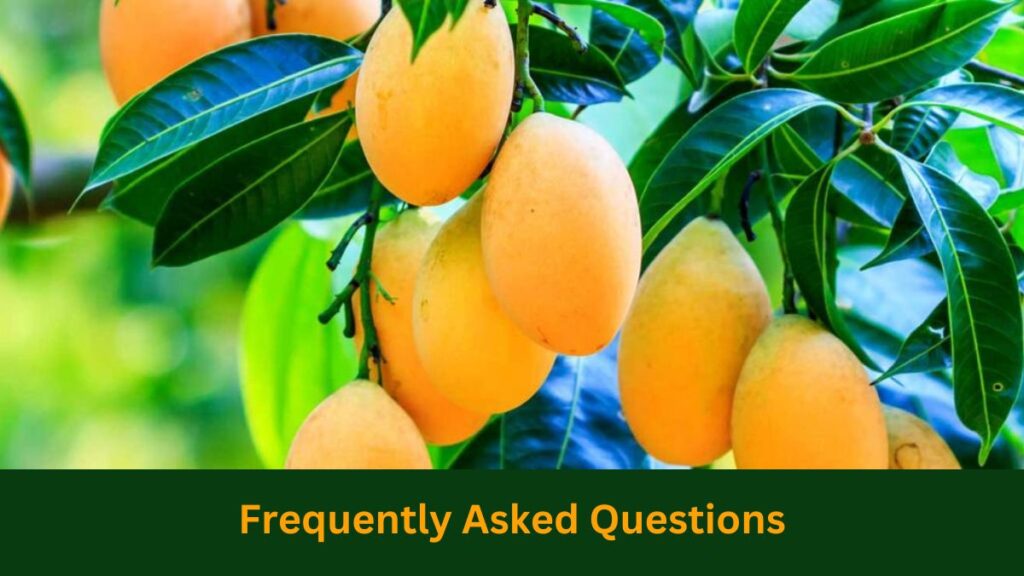
Are Parakeets able to eat cooked or frozen mango?
Mango can be eaten frozen or cooked by parakeets. However, the majority of the nutrients and the juicy, delightful taste are lost when the mango is cooked or frozen; as a result, it is not as healthy as fresh mango. Fresh mango is the most nutrient-dense and delectable mango, yet frozen or cooked mango is both edible and acceptable.
Can parakeets Eat Mango Skin?
Mango skin or peels are frequently peeled off and discarded in order to reveal the fruit’s delicious flesh. Contrary to popular opinion, mango peels can be eaten and are full of nutrients. Mango skins are rich in dietary fiber, vitamin E, polyphenols, and vitamin E, according to nutritionists. If your bird is obese, mango peels are a wonderful fruit choice since they aid in decreasing adipogenesis.
Mango peel can be eaten by parakeets, however, there are specific situations where you might decide to discard them. The mango skin’s thick texture may make it difficult for the parakeet to chew and swallow, and it may also contain dangerous pesticide residues.
Is it okay to give parakeets dried mangoes?
Mangoes that have been dehydrated and dried in the sun or artificially to keep them fresher for longer are known as dried mangoes. Those who year-round crave mangoes typically purchase dried mangoes. Do your parakeets, however, have permission to share the dried mangoes? only if you dried them yourself at home.
This is due to the fact that most dried mangoes purchased in stores are preserved with a number of chemicals and preservatives. Additionally, even though these chemicals might not have an impact on human health, they could be fatal to your weak pets.
Are Parakeets able to eat mango juice?
The nutritional value of mango juice is similar to that of the fruit itself. There is hence no reason why your parakeets shouldn’t drink the fruit’s juice if they can eat the fruit. However, you should only give them homemade mango juice, never ones from the store. Since they might contain additives, preservatives, and refined sugar, all of which could be harmful to the health of your feathered pet.
Can I give my parakeets licorice?
No. The majority of birds, including parakeets, are thought to be poisoned by licorice. Therefore, it is not a good idea to give children licorice.
Do parakeets eat liquids?
Indeed, parakeets require water just like other birds do. You must ensure that your feathery friend has access to clean drinking water all day long.
Conclusion
Mangoes are without a doubt one of the healthiest fruits you can give your parrot. It is packed with vitamins and minerals that are crucial for your bird’s healthy growth. Mangoes have a high sugar content, which can be harmful to your bird if consumed in excess, therefore you should only offer them occasionally.
Mangoes are one of the fruits that most parakeets like to pick out of a fruit mix and like eating. I hope this post has clarified any questions you had regarding feeding parakeet mangoes. If you require any additional details or have any questions, please let us know in the comments section below.

